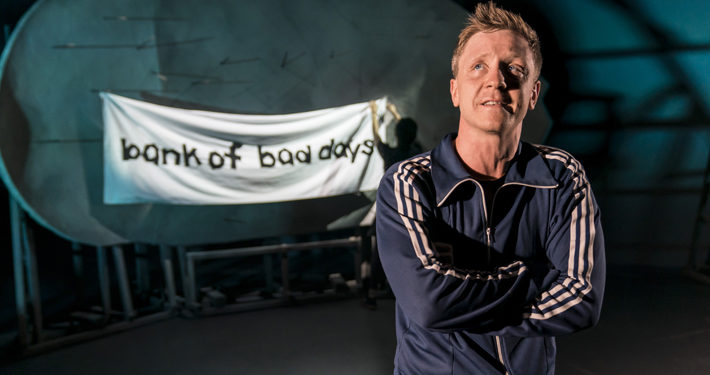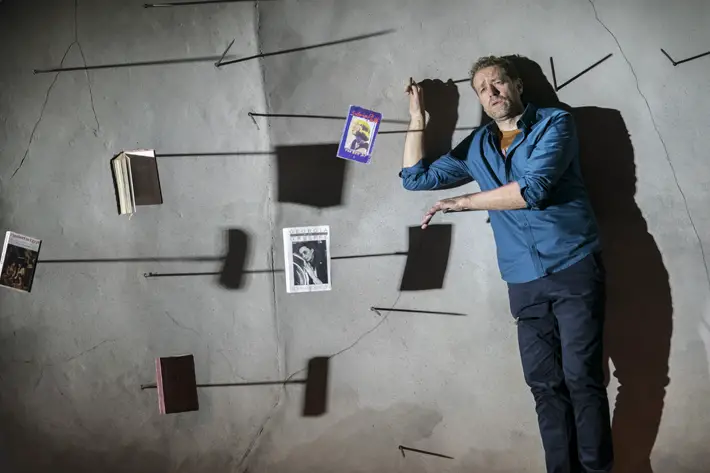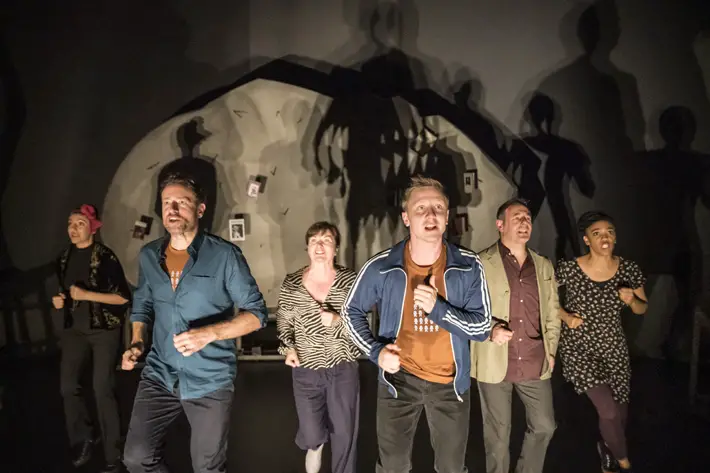Reasons to Stay Alive – Review – Leeds Playhouse

By Richard Mansfield, November 2019
Despite this being a play about a man’s experience of depression and his way of overcoming the illness, it somehow managed, perhaps against the odds for such a serious topic, to be a joy to watch. As a co-production between English Touring Theatre (ETT) and Sheffield Theatres, this tour will conclude at the weekend, though it must surely deserve a much longer and wider exposure.
The excellent play is based on the book of the same name by author Matt Haig, one which graphically chronicles his very own personal struggles with this mental illness, from its very severe onset when he was 24-years-old until recent times.
The script, an accomplished and accurate adaptation by April De Angelis, faithfully follows what happened to Matt when conventional therapies seemed to provide him with no relief or cure. He had found there was no self-help ‘handbook’ to guide a way out of it and his account offers an approach which in the end worked for him and that may work for others.
“Agility”
It pays heed to the uniqueness of each individual’s experience of suffering within what may indeed be the rather generic term ’depression’. Furthermore it recognises the courage and perhaps ingenuity that it must take to face and to overcome the demons associated with it. As one might expect, the importance of both professional and familial understanding and support is acknowledged. Also offered is an accessible insight for those, like me, who have hitherto had the good fortune to escape depression.
From the outset this play, with its visually dramatic set designed by Simon Daw and lit by Jessica Hung Fun, exudes the fracture, torment and bleakness brought to the minds of those who suffer this invisible illness. The opening scene evokes tangible danger from high on the set, as Matt, played as his younger self by Mike Nobel, contemplates ending his life by stepping off a cliff. The set incidentally is one which demands significant agility from the cast who need to be very sure-footed as they climb above the stage floor on several occasions throughout the play.
“Life affirming”
As the story progresses the young Matt engages in dialogues with himself in the form of older Matt, played by Phil Cheadle. The elder seeks to challenge the notions which seem to so challenge the younger self and almost to incapacitate him. It is Matt’s girlfriend Andrea, very ably played by Janet Etuk, who, with the her sheer tolerance, patience and seemingly endless support, which indeed can only come from love, provides a crucial ingredient to his ultimate recovery.
In and amongst all the drama, there is some brief but nonetheless leavening humour which feels to augur the possibility of a happy ending. Indeed, there is one, but there are no complacencies offered and no evasion of the risk of relapse. To address this and to be alert, Matt has, among a number of lists, one which offers life affirming ‘reasons to stay alive’, an idea and tool beneficial to us all.
Reasons to Stay Alive is directed superbly by Jonathan Watkins, whose background is in choreography – and it shows. His direction brings so much life and energy to the play and, as has been suggested or alluded to elsewhere, it brings so much extra to the language and feeling of what is projected to the audience.
“Full commitment”
He is well served by an accomplished cast which also includes Chris Donnelly and Connie Walker, as Matt’s parents who at first may seem to struggle with Matt’s condition but who, in due course, take up the example of their now daughter-in-law, Andrea. Diliek Rose very convincingly fills in each of three minor roles. They all show a full commitment to Jonathan Watkins’ direction, especially that of movement, which so complements the message to be conveyed.
At its conclusion the performance drew a merited and very appreciative response from the sizeable audience.
This evening’s showing was supported by a pre-performance discussion group with a panel composed of Wesley Bennett Pearce (producer at Leeds Playhouse), Andrew Hughes (producer with ETT) and Sepy Baghei (Assistant director with ETT). This was very relaxed, informative and allowed a valuable period of questions and answers from the floor and panel. Although this particular format will not be repeated during its run at Leeds, others will be offered and can only enhance the entertaining and educative benefits to be had from this production.
Incidentally, Leeds Playhouse re-opened a couple of months ago and gone is the red brick, which seemed to be so dated and jaded, now replaced with smoother surfaces and lines complemented by much brighter decor and facilities. A far more modern feel.












